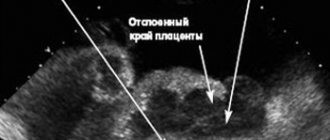What affects weight?
The weight of the fetus is primarily influenced by heredity. If mom and dad are big and large, then the probability that they will have the same “hero” is more than 90%. Miniature, short, thin mom and dad usually give birth to a baby with low weight. It is quite difficult for any external factors to influence this pattern.
However, pregnant women should remember that there are factors that cannot but affect the baby’s body weight. First of all, it's nutrition. If a mother eats well and in a balanced manner, then her baby, along with the blood, will receive a balanced set of nutrients that will help him develop and grow harmoniously. If the expectant mother overeats, is addicted to carbohydrates, cakes, pastries, and abuses vitamin complexes, even if she does not have a vitamin deficiency, then the child receives all this through the uteroplacental bloodstream. The mother's weight is growing, and the baby's weight is also growing.
Smoking during pregnancy can also affect the weight of the fetus. 70% of pregnant women who smoke give birth to underweight children. In the same way, alcohol, drugs, and even conventional medications that the mother took during pregnancy affect the fetus. The mother’s nervous stress and worries, hard physical work, and working conditions in hazardous work have an adverse effect on the baby’s body weight.
Some chronic diseases that the expectant mother has also affect the baby’s weight. For example, with diabetes mellitus or gestational diabetes, which first appeared during pregnancy, there is a chance of giving birth to a large or even gigantic baby, whose weight will exceed 5 kilograms. And insufficient fetal weight can manifest itself in chronic diseases of the kidneys, liver and heart in a woman.
Features of the course of pregnancy cannot but affect the weight of the child. If everything is going smoothly, then there is nothing to worry about. But a baby who develops in conditions close to extreme - against the background of the threat of miscarriage, with other complications of pregnancy - is unlikely to be a hero.
If the pregnancy is multiple, a woman is carrying two or three babies, then the weight of each will be less than normal, and this is quite natural.
Excess weight: where is the danger?
The reason is not always just overeating. Often, several kilograms above the norm are serious “bells” indicating that not everything is in order with the health of the mother or baby.
What affects weight gain
1. Age: the older the woman, the higher the tendency to be overweight.
2. Weight loss in the first months of pregnancy due to toxicosis leads to the fact that as the period increases, the expectant mother’s body tries to make up for what was lost, so the woman often overeats.
3. Multiple pregnancy.
4. Polyhydramnios occurs in certain conditions:
* diabetes mellitus, both an independent disease and one that developed during pregnancy (gestational diabetes mellitus);
* intrauterine infection: candida, staphylococci and streptococci, TORC infection and others;
* severe form of hemolytic disease of newborns - when the mother’s immune system “does not recognize” the Rh and/or blood type of the fetus, and therefore begins to destroy the baby’s red blood cells.
Jaundice of newborns. Dangerous and non-dangerous jaundice
5. Edema/fluid retention in the body often occurs with gestosis, which poses a threat to both mother and baby. The functioning of vital organs and uteroplacental blood flow are disrupted, placental abruption and other complications are possible. Main manifestations: edema, high blood pressure and protein in the urine.
Preeclampsia in pregnant women
What are the dangers of being overweight?
The risk of developing certain diseases increases. Curvy expectant mothers run the risk of developing hemorrhoids, varicose veins, high blood pressure, radiculitis (back pain), diabetes and other ailments.
In addition, with excess weight, the fetus is often large, the tissues lose elasticity due to the accumulation of fat and retained fluid. As a result, childbirth is often difficult.
Body weight: more than normal - worse?
As we have already said, you should not be fanatical about measuring your body weight and measure it every day, worrying about every extra gram of fat on the scale or in the mirror. During pregnancy, the issue of aesthetics should not be paramount, and all indicators and measurements should be considered purely from a medical point of view. Pathologies in weight gain, weight loss or excessive gain may be symptoms of serious infectious diseases or disorders of general metabolism. Neither the first nor the second option will be beneficial for the development of your baby.
The most common and dangerous cause of a sharp increase in body weight is gestosis, one of the manifestations of which is edema. It is the water that accumulates in the body that is not excreted that can lead to a jump in the mass indicator. If you experience symptoms such as hypertension, edema, weight gain, urinary retention, nausea, contact your doctor as soon as possible.
No less dangerous is underweight in a pregnant woman, as this indicates a metabolic disorder, and as a result, impaired fetal development. Deficiency is especially dangerous during the first trimester of pregnancy. According to statistics, more than half (about 75%) of women with underweight are at risk of premature birth. But even in the case of a full-term birth, there is a high probability that the child will have significant underweight, which is one of the main indicators of prematurity. Therefore, a pregnant woman’s diet should be balanced, rich in microelements and vitamins.
During the entire period, women with underweight are more susceptible than others to infectious diseases, which are most dangerous during these nine months. The reason is a decrease in the functioning of the immune system, which does not receive proper energy nutrition from metabolism.
Factors influencing the number of kilograms gained
A number of factors influence how many kilograms a woman will ultimately gain during pregnancy:
- Initial weight of the expectant mother. It is interesting that thin young ladies gain weight much faster than ladies with a body. And the farther from the norm their “pre-pregnancy” weight was, the faster it will change in a positive direction during the process of bearing the baby.
- Tendency to corpulence. Even if you adhered to a strict diet and performed effective exercise before pregnancy, during the happy expectation nature will still give you a couple of extra pounds.
- Height. It is generally accepted that the taller a woman is, the more pounds she will gain during pregnancy.
- Large fruit. This is a natural indicator. A woman expecting a large baby will gain more than the average weight.
- Dropsy of pregnancy. Edema signals the accumulation of a large amount of fluid in the body, which also tends to “weight down” its owner.
- Toxicosis of the first and gestosis of the third trimester of pregnancy. The nausea and vomiting that often accompany these conditions can lead to weight loss.
- Increased appetite. A pregnant woman simply must take control of this factor, which is directly related to an increase in estrogen levels, otherwise she faces gaining extra, absolutely unnecessary kilograms.
- Polyhydramnios. An increase in the amount of amniotic fluid also affects the number of kilograms that the scale arrow shows.
- Age. In adulthood, a woman is more likely to exceed the weight gain norms set by doctors.
More on the topic “Normal weight gain during pregnancy”:
Seasonal weight fluctuations
On the scales... Ah! Norm of weight gain. The table shows the average weight gain (in kilograms) during pregnancy depending on the woman’s BMI before the Fluctuation...
I feel like I'm gaining weight, but the scale says otherwise
Section: Need advice (I haven’t gained any weight on the scale, but that’s how I feel it). I feel like I'm gaining weight, but the scale says otherwise. Dear girls! I’ve been reading you for a long time and I’ve even lost 13.5 kg since...
Weight loss during pregnancy.
Weight loss during pregnancy.. Nutrition, vitamins, medications. Pregnancy and childbirth. As a rule, normal weight gain during pregnancy is 8-14 kg, on average 10-12 kg. Table of weight gain by week of pregnancy.
Friday Libra
About the scales. And when you see at least +100 grams on the scales, you fall into despair) Friday scales are much more effective. I'm upset( +450, Total 58.5... On the scales... Ah!
On the scales)
On the scales... Ah! But weight gain for each woman is individual and depends on the woman’s weight before pregnancy, or more precisely on the body mass index of the expectant mother. there is a special...
ow! scale report!
As I saw 55 on the scales... The scales on the ruler twitched convulsively and covered the target number - it turns out that they had a step, a jerk, of 1 kg. Weight loss report. On the scales... Ah!
Weight Gain Calculator
Weight gain during pregnancy. How much weight should a woman gain in 36 years? A friend has been promiscuous for 36 years and does not use contraception. Table of weight gain by week of pregnancy. Age and weight of the embryo in weeks.
weight gain and gender of the child
does it depend??? For those who have not had their first B, share your feelings))) I gained almost 18 kg as a boy. at 32 weeks it was +10500. Now it’s almost 34 weeks, it’s a girl, there’s also an increase of about that (10,300 but still a little less...
weight morning and evening
On the scales... Ah! Body weight gain among different women during pregnancy can vary widely, reaching 20 kg or more.
Stopped gaining weight
I stopped gaining weight. I haven't recovered for 3 weeks now. By 30 weeks I gained 11 kg and then the weight stopped. Maybe this is due to going on maternity leave (I started eating little and often)? At the ultrasound at 32 weeks, my baby was 33-34 weeks in all measurements, but I still started to worry a little about the weight.
Libra - report, 28.02
On the scales... Ah! But weight gain for each woman is individual and depends on the woman’s weight before pregnancy, or more precisely on the body mass index of the expectant mother. there is a special...
What's with the scales?
What's with the scales? Need some advice. Weight loss and diets. How to get rid of excess weight, lose weight after childbirth, choose a suitable diet and communicate with those who are losing weight.
Weight gain chart?
Weight gain chart?. Fetal development. Pregnancy and childbirth. 7ya.ru is an information project on family issues: pregnancy and childbirth, raising children, education and career, home economics, recreation, beauty and health, family relationships.
16 weeks +4 kg is too much?
Somehow it seems to me that I am adding a lot. Now I’m almost 16 weeks and I’ve gained 4 kg. Is 4500 a lot? I looked at the tables and it was necessary to gain a max of 2.8 kg. How do you gain weight? I'm very worried.
Morning and evening - weight difference
On the scales... Ah! Body weight gain among different women during pregnancy can vary widely, reaching 20 kg or more.
When does active weight gain begin?
Remind me plz! Otherwise, I don’t remember myself - either closer to 20 weeks, or later? This means that I’m already 17 weeks and haven’t gained any weight yet, I’m overweight, and I don’t want to miss the moment - when it’s already NECESSARY, and not just gluttony
Tables corresponding to height and weight for a certain age
Table of weight gain by week of pregnancy. Age and weight of the embryo in weeks. Child's height and weight: what is the correct increase? Here in topics about weight, tables of height and weight corresponding to a certain age are constantly mentioned.
Underweight
Table of weight gain by week of pregnancy. Age and weight of the embryo in weeks. Weight gain by trimester. Problems associated with lack and excess body weight. It is calculated as follows: BMI = weight (kg)/.
in a week I gained only 200 grams :( and for
Table of weight gain by week of pregnancy. How much do we weigh in grams? Weight gain at the 20th obstetric week. Section: Weight (who gained how much in the 20th obstetric week). My mother and a friend gained 24 kg each during pregnancy, resulting in 29 weeks and 14 kg.
Third trimester
About 400 g are added per week. Calculating weight gain during pregnancy by week is an important means of monitoring health status. It is important to understand that sudden weight gain is a risk not only for your figure after childbirth. It may indicate serious problems in the body. For example, such a rapid increase is often associated with edema. This should alert the expectant mother and doctors, because edema is often one of the symptoms of late gestosis. High blood pressure may also occur. True, you shouldn’t be afraid of changes in body weight. Pregnant women have to regularly undergo blood and urine tests, so such deviations in the functioning of the body will make themselves felt.
And a little about secrets...
The story of one of our readers, Inga Eremina:
I was especially depressed by my weight; at 41, I weighed as much as 3 sumo wrestlers combined, namely 92 kg. How to completely lose excess weight? How to cope with hormonal changes and obesity? But nothing disfigures or makes a person look younger than his figure.
But what can you do to lose weight? Laser liposuction surgery? I found out - no less than 5 thousand dollars. Hardware procedures - LPG massage, cavitation, RF lifting, myostimulation? A little more affordable - the course costs from 80 thousand rubles with a nutritionist consultant. You can, of course, try to run on a treadmill until you go crazy.
And when will you find time for all this? And it's still very expensive. Especially now. Therefore, I chose a different method for myself...
Read more >>
Insufficient weight gain
Insufficient weight gain signals a deficiency in the supply of nutrients and vitamins to the female body and is also dangerous for the mother and child.
Important
If a pregnant woman is deficient in nutrition and gives birth to a low-birth-weight fetus in the future, there is a high likelihood of heart disease, atherosclerosis, diabetes, allergic reactions, obesity and mental disorders.
Causes
Insufficient weight gain in a pregnant woman may be due to:
- early toxicosis;
- nutritional deficiency or malnutrition;
- bad habits;
- chronic extragenital diseases (diseases of the gastrointestinal tract, heart, lungs, chronic infections);
- following diets.
What threatens
Insufficient body weight gain for the mother is dangerous due to the following complications:
- spontaneous termination of pregnancy or its threat;
- complications of childbirth (weakness of contractions, incoordination, bleeding during childbirth, after childbirth);
- iron deficiency anemia, hypovitaminosis;
- complicated course of the postpartum period (purulent-septic diseases, uterine subinvolution).
For the fetus:
- intrauterine developmental delay;
- prematurity;
- light weight;
- intra-, antenatal death;
- intrauterine developmental anomalies;
- retardation in mental/physical development;
- increased risk of injury during childbirth;
- difficult adaptation to extrauterine life;
- weakened immunity, risk of inflammatory diseases;
- death in the first 7 days after birth.
Where do kilograms come from?
We found that “legal” weight gain during the entire pregnancy can average 13 kg. What do these “pregnant” kilograms consist of:
- child – 3000-3500g;
- uterus – 900-1000 g;
- afterbirth – 400-500 g;
- amniotic fluid – 900-1000 g;
- increase in blood volume – 1200-1500 g;
- additional liquid – 1500-2700;
- breast enlargement – 500 g;
- fat deposits – 3000-4000 g.
Total – 11400-14700 g.
As you can see, food for two is not provided here. So this idea can be discarded right away. However, for the development and bearing of a healthy child, reserves are needed, which the mother’s body draws from nutrition. The diet of pregnant women should indeed be a little higher in calories than others, but not by much - only plus 200 calories per day in the first half and plus 300 calories per day in the second half of pregnancy.
If the doctor has come to the conclusion that the pregnant woman’s weight exceeds the permissible norm, you should first try to give up flour, sweets and animal fats. You should not sharply limit your diet, because changes in weight provoke changes in blood pressure. Portions should be reduced gradually, but you should not give up cereals and plant foods. You need to eat often, but little by little. And monitor your fluid intake: 6-8 glasses a day without fail.
It is advisable to weigh yourself every day for control; it is best to do it in the morning on an empty stomach and always in the same clothes to obtain the most reliable data.
Do not rush to be upset if your indicators do not coincide with the above standards, because everything is individual. Focus on how you feel and your doctor’s advice. Remember that after giving birth you will gradually return to your previous shape if you put in a little effort. This process will go faster if you breastfeed your baby. But if you gain excess weight during pregnancy, it will be more difficult to lose those extra pounds.
Please note that malnutrition during pregnancy is much more dangerous than overeating. However, try to keep yourself within limits.
Especially for beremennost.net - Elena Kichak
Pregnancy and sports
Of course, you shouldn't give up physical activity during pregnancy. Of course, many activities will be significantly limited because they carry a risk of miscarriage. But activities such as swimming and yoga for pregnant women will only bring benefits. Moreover, specially designed exercises help prepare a woman’s body for childbirth. The fetus also requires oxygen, so walking is very useful. They should be continued until the very last days of pregnancy. Of course, if it becomes difficult to move, you have to shorten the distances and slow down the pace.
Sports activities for pregnant women depend on their physical fitness before pregnancy. For example, pregnant women are not recommended to lift weights, if ordinary expectant mothers should not carry heavy bags from the store and it is better to ask loved ones or buy in parts, then a woman who was engaged in power lifting before pregnancy lifted 100 kg, and during this time - only 50 This is “a little” for her. Of course, you shouldn’t look up to her. Therefore, if you previously had a non-sports lifestyle, then you should add only light physical activity and definitely walks in the fresh air. If you combine this with sufficient, but not excessive nutrition, rich in vitamins, then calculating weight during pregnancy will most likely please you with acceptable numbers.
What should the baby's weight be by week of pregnancy?
In the first trimester, it is very difficult to determine the baby’s weight, because he is still very small. And doctors are still of little interest in this indicator.
In the first weeks of pregnancy, the most complex processes of the formation of all the tissues and organs of the baby occur, so during the examination, doctors will first of all look at the presence/absence of all vital structures in his body.
Although the rate of weight gain in the first months of life is impressive: from 1∙10-6 g (the weight of the cell formed as a result of the fusion of sperm and egg) to 10-13 g at the end of the 12th week of gestation.
In the future, the rate of growth will not be so colossal, and if you count the weight gain per week, then it will be greater the closer the moment the child is born.
However, just before birth, in the last 2 weeks, fetal weight changes more slowly.
In the second and third trimesters, the child’s weight by week normally has the following values:
- At week 13, when the child has already formed all the organs and their systems, his weight is 14-20 g with a height of approximately 60 mm.
But even though he can move, the mother will not yet feel his kicks.
From 14 to 20 weeks, smaller details of the baby’s structure are formed (finger patterns, hair), weight is 220-270 g. The fetus is already large enough for its movements to become noticeable to the mother.
In the next 4 weeks (from 20 to 24), the weight of the fetus reaches 550-600 g. The woman feels its active movements.
In case of premature birth, the fetus can survive if its weight is at least 500 g.
By the end of the 26th week, the baby's organs have completed the main stages of formation, so the baby has a high chance of life if premature birth occurs. Now its mass is 750-850 g.
By the thirtieth week, most babies are already turning their head down, preparing for a natural birth. The length of the fetus at this time reaches 24 cm, and its weight is 1100-1300 g. At about 34 weeks, another ultrasound examination is usually prescribed, during which measuring the approximate weight of the fetus will be a mandatory item. Normally it should be 2100-2300 g.
From 34 to 38 weeks, the baby grows quickly, gaining approximately 200 g every 7 days. If childbirth occurs at the end of this period, the pregnancy can already be considered full-term. Fruit weight – 3100-3200 g.
By the end of the 40th week, it is time for the baby to be born. Most women give birth during this period. The weight of the child at birth usually reaches 3200-3600 g, and the height is about 50 cm. If birth does not occur, the pregnancy is considered post-term. In the absence of labor, it is induced artificially. Within 41-42 weeks the baby grows to 3500-3800 g.
Slowly but surely
In the first trimester of pregnancy, don't worry too much about weight gain. It's already good if you don't feel sick in the morning.
If your initial weight was normal, you need to gain very little in the first months. This can be done by adding 150-200 calories to your daily diet: approximately 250 g of low-fat yogurt.
In the second and third trimesters, stable weight gain is more important. Often this means that you need to add one and a half to two kilograms per month. For an extra 300 calories, add half a sandwich topped with peanut butter and jelly and a glass of low-fat milk for an extra 300 calories. This is enough for normal weight gain. If you were underweight early in your pregnancy, your doctor may recommend adding calories.
More on the topic “Weight gain by week during pregnancy”:
Well, the zhor attacked me))
It's week 38 and I'm eating like crazy. The total weight gain at the moment is 9600. I really want to give birth) sometimes when I walk, it seems to me that something is growing between my legs, but I can’t see it. Listen, do you need compression stockings for childbirth? Do you have to buy them yourself or do they give them out in maternity hospitals? How is your general health?)
Weight gain at the 20th obstetric week
Girls, who added how much? I have + 7 kg. It seems that this is a lot (. Will there be a plus in the progression further or is there about the same amount of increase in the second half of pregnancy?
weight gain
Good afternoon. I'm 15 weeks pregnant. Everything seems ok. just came from the doctor. I gained 2.5 kg throughout my pregnancy. She yelled at me terribly. She says that given my weight, I should generally lose weight, otherwise the future will be terrible and terrible. My height is 182, weight is 97.5 kg. Drink as little water as possible, eat as little as possible, do not walk or lie down (at 5-6 weeks there was a hematoma, but now it seems not). Question: is it really that scary? and what to do? what lifestyle to lead and what to eat and drink?
Have you gained much weight by 17 weeks?
Hi all! I’m coming to you for the first time and immediately with a question that’s tormenting me - kilograms. I'm now 16.5 weeks. I gained 5... or maybe already 6 kg. I can’t fit into almost any old thing. I'm starting to panic - maybe there will be more...
weight gain and gender of the child
does it depend??? For those who have not had their first B, share your feelings))) I gained almost 18 kg as a boy. at 32 weeks it was +10500. Now it’s almost 34 weeks, it’s a girl, there’s also an increase of about that (10,300 but still a little less...
Is 2.5 kg in 2 weeks a lot?
Girls, I visited the doctor today and gained 2.5 kg in 2 weeks. Before B I weighed 51 kg, now I’ve only gained 7 kg, is this really a lot for my weight? I read that those who weighed little before B can gain more. I seem to eat as usual, I don’t drink very much—one and a half liters a day. There is no swelling, tests are good, ultrasound is good. And the gray-haired doctor scolded me like that ((
weight gain >1 kg per week in 2nd trimester
In 2 weeks I gained at least 2.5 kg. It's not scary, right? I read on one website that if you gain more than a kilogram per week, you need to see a doctor (just in case). I went through different tablets on weight gain (both Russian and foreign) - 3 out of 4 when entering my pre-pregnancy parameters show that I am overeating by a kilo and a half.
Stopped gaining weight
I stopped gaining weight. I haven't recovered for 3 weeks now. By 30 weeks I gained 11 kg and then the weight stopped. Maybe this is due to going on maternity leave (I started eating little and often)? At the ultrasound at 32 weeks, my baby was 33-34 weeks in all measurements, but I still started to worry a little about the weight.
I'm not gaining weight. This is bad?
Hello everybody! I’m gaining weight so badly. The second trimester has begun, and I only weigh 50 kg. I'm still waiting for the tummy to appear. The doctor says that this is normal. Are there those who also gain weight poorly?
weight gain
Girls, tell me, what is normal weight gain during pregnancy? Does it vary by month?
16 weeks +4 kg is too much?
Somehow it seems to me that I am adding a lot. Now I’m almost 16 weeks and I’ve gained 4 kg. Is 4500 a lot? I looked at the tables and it was necessary to gain a max of 2.8 kg. How do you gain weight? I'm very worried.
When does active weight gain begin?
Remind me plz! Otherwise, I don’t remember myself - either closer to 20 weeks, or later? This means that I’m already 17 weeks and haven’t gained any weight yet, I’m overweight, and I don’t want to miss the moment - when it’s already NECESSARY, and not just gluttony
How to weigh yourself correctly?
Here, several questions have arisen: 1. when should you weigh yourself: in the morning, on an empty stomach, or vice versa in the evening? Or is it important that the time always be the same? 2. And which scales are better? electronic or regular? 3. How much increase per week is normal?
weight gain
I'm 28 weeks and have gained 8kg overall. (now I weigh 60 kg.). Yesterday the doctor scolded me for a long time, threatened me with hospitalization if I didn’t go on a diet, and said that during the entire pregnancy I would not lose more than 10 kg. She sent me for a terrible, painful IOC test (?), the test was negative, and in general I was told to eat 1.5 kg a day. apples or half a kilo of cottage cheese and no more than a liter of liquid. But I’m hungry and dizzy from hunger. What to do? I don't really want to go to the hospital.
Parameters that make up a pregnant woman’s weight
The weight gained is made up of the following parameters:
- A full-term fetus
weighs about 3500 g (this is a very average figure, since the lower limit of normal birth weight is 2500 g); - Placenta
– 600 g; - Amniotic fluid
– 1 l (kg) (amniotic fluid that surrounds the baby); - Uterus
– 1 kg (is a fruit repository); - The volume of circulating plasma
is 1.5 l (2 kg) (the so-called “third circle of blood circulation” appears - mother-fetus, therefore the volume of circulating blood during pregnancy increases mainly due to the liquid part); - Deposition of subcutaneous fat
, development of the mammary glands – 2.5 kg (the mammary glands are gradually prepared for feeding from the very beginning of pregnancy); - Umbilical cord
, membranes – 500 g.
How to avoid gaining excess weight during pregnancy?
The basis is proper nutrition. A balanced diet, devoid of too sweet and fatty foods, will help you gain the weight necessary to fully supply the developing fetus with the necessary substances.
Causes of pathological weight gain
Possible factors that cause large weight gain:
- too low weight (very thin women usually quickly gain body weight, ahead of normal indicators, in this case it is better to determine “normal pre-pregnancy weight” using the formula “height (in cm) minus 100”, and calculate the increase based on its value);
- high body weight and obesity;
- high growth;
- large fruit;
- swelling, including with the development of gestosis;
- increased appetite under the influence of high concentrations of estrogen at the beginning of pregnancy;
- polyhydramnios;
- age over 35 years.
What to do with extra pounds?
The daily calorie requirement for a normal weight pregnant woman with little physical activity (less than 30 minutes of exercise per week) is:
- in the 1st trimester 1800 kcal;
- in the 2nd trimester 2200 kcal;
- in the 3rd trimester 2400 kcal.
This calorie content must be achieved by eating cereals, dairy products, animal and vegetable proteins, vegetables, and vegetable oils. Refined foods, sugar and saturated fats (mostly animal fats) should be limited.
Losing excess weight during pregnancy is difficult and in some cases impossible. However, you can slow down your weight gain if you follow these recommendations:
- Use low-fat dishes - chicken breast, greens, tomatoes, baked potatoes. Avoid French fries, nuggets, and fatty cheese.
- Avoid fatty dairy products. You should consume at least 4 servings of milk per day, but it should be skim or 1-2% fat milk or yogurt.
- Limit sweets and sugary drinks, give preference to water, regular or mineral, with or without gas.
- Do not add salt while cooking.
- Limit high-calorie foods - confectionery, sweets, honey, chips. Replace them with fresh fruits and low-fat yogurt.
- Reduce the amount of oil, mayonnaise, and sour cream consumed.
- Avoid frying foods in oil and instead eat boiled or baked foods.
- Walk or swim regularly, unless your doctor prohibits physical activity.
What you can eat to avoid excess weight gain:
- bread, pasta, potatoes, rice, other cereals, preferably whole grain varieties (for example, brown rice and cereal breads) - these products should make up a third of the daily diet;
- fruits and vegetables, up to 5 servings per day - this is another third of food for the day;
- meat (but not liver), fish, eggs and legumes;
- skim milk, yogurt, low-fat cheese;
- It is not recommended to limit fluid intake even if hidden edema appears; it is advisable to drink as much as you want.
Recommendations for proper food intake during excess weight gain:
- Cut food into very small pieces.
- Eat with a dessert fork, and after each bite, place it on the plate and place your hands on your knees.
- Chew food thoroughly.
- After consuming half the serving, take a break for 3 minutes.
- Do not read or watch TV while eating.
- Have dinner no later than 19:00.
- Go grocery shopping after eating.
- Do not try dishes while they are being prepared, and do not eat leftover food for children.
- After eating, walk or stand for half an hour.
- Don't lie down during the day.
In addition, it is recommended to increase physical activity:
- Do not use the elevator.
- Do not reach 1 stop before the desired one.
- While talking on the phone and even watching TV, do not sit, but stand.
- Do not use the TV remote control, but press the necessary buttons manually.
- On weekends, take longer walks.
- Do yoga or swimming at least once a week or more often.
Rapid weight gain may be a sign of hidden edema. In this case, it is necessary, in addition to body weight, to control the volume of fluid drunk and excreted per day. If a woman drinks more fluid than she produces urine, the weighing readings increase quickly. In such cases, obstetricians often prescribe treatment in a day hospital.
What to eat and what not to eat?
A balanced diet will help you maintain normal weight gain during pregnancy.
But diet doesn’t just mean “eliminate.” Although something will have to be excluded or limited. Moreover, we are not talking about fasting.
A diet is a proper, balanced diet suitable for a specific situation. This means that you need to eat, first of all, healthy foods that provide mother and baby with energy, vitamins and microelements.
You need to eat small and often - 5-6 times a day, every 3-4 hours. Avoid long breaks between meals and do not overeat.
A pregnant woman's diet should contain sufficient amounts of protein. To do this, you need to eat meat, fish, cottage cheese, hard cheese, dairy products, and legumes.
Vegetables and herbs, fruits and berries will help stabilize your weight.
If you gain a lot of weight, you should limit fruits such as grapes and citrus fruits. They contain a lot of sugar, so they can affect the rate of weight gain.
Fats should also be present in the diet of the expectant mother. But it is better to give preference to vegetable oils and nuts. For example, one handful of nuts can cover your daily fat requirement.
Useful: Twins pregnancy: causes, signs, birth and course of pregnancy.
Complex carbohydrates contained in unrefined cereals and whole grain bread provide a pregnant woman with energy for a long time. Plus it is a source of vitamins and microelements.
But easily digestible carbohydrates (baked goods, sweets, candies, chocolate, juices) should be excluded from the diet if there is a tendency to excessive weight gain.
Overweight women are also advised to limit the amount of table salt in their food. Salt promotes fluid retention in the body, which is completely undesirable during pregnancy.
It is worth excluding smoked meats, canned food, marinades and pickles from the diet.
Are fasting days necessary?
Sometimes such a need arises. But the decision about the need to spend fasting days should not be made by a pregnant woman on her own.
If in some specific case the attending physician resorts to this method of normalizing the weight of a pregnant woman, then he must explain to her all the nuances of this process in detail (what products can be used, how much and how).
When they talk about excess weight
Weight fluctuations within plus 1-2 kg are perceived by doctors as normal. With such a small increase, minor adjustments to the diet, changes in daily routine, and an increase (within reason) in physical activity are usually recommended.
A large increase, especially if it is recorded not by month, but by week, is a serious cause for concern.
This situation can have serious consequences not only for the expectant mother, but also directly for the child. For example, often in such situations, the fetus is diagnosed with a malfunction of internal organs, which increases the risk of injuries during childbirth, as well as congenital pathologies.
Making the right diet
After the test showed the coveted two stripes, your life changes in all aspects and changing your diet is no exception. In order to feel good, minimize the effects of toxicosis, and bear and give birth to a healthy baby, it is important to eat right.
How can you not eat during pregnancy?
Eating habits change dramatically while expecting a baby. Some people start eating things that they couldn’t stand before pregnancy, while others, on the contrary, give up their favorite foods. The appetite either disappears or returns with a vengeance. There are several nutritional rules that should be followed:
- It doesn’t matter whether you have an appetite or how much you suffer from toxicosis, you can’t give up food completely.
- Review your meal schedule. It is better to make smaller portions and increase the frequency of meals to six times a day. This method will help cope with toxicosis, heartburn, bloating and heaviness in the stomach.
- It is worth calculating the required calories not only by their quantity, but also taking into account their quality. For example, 100 calories in vegetables or boiled chicken breast will be much healthier than 100 calories in chips or chocolate.
- Choose products containing different vitamins, micro- and macroelements.
- Be sure to supplement your diet with fresh fruits, which, in addition to useful elements, also contain fiber.
- It is necessary to calculate the amount of foods rich in fat, such as cheeses, sour cream, fatty fish, nuts, poultry and butter, so that they make up no more than one third of the diet. There is no need to exclude them at all, as they are rich in proteins valuable for the baby.
What should you not eat during pregnancy?
It is believed that expectant mothers can do anything! If you want it, it means that the growing baby requires it. But this is a very dangerous misconception, since there are foods that should, if not be completely excluded from the diet, then at least limit their consumption. These include:
- Simple refined carbohydrates found in rich white baked goods, sweets and syrups. It is better to replace them with complex unrefined carbohydrates, such as those found in whole grain bread, brown rice and boiled potatoes.
- Salt, salty and pickled foods, which contribute to fluid retention and cause swelling.
- Chocolate, strong black tea and coffee. In addition to excess caffeine, which is unlikely to be needed by the mother and certainly not needed by her baby, such products interfere with the intake of iron and folic acid.
- Anything that contains preservatives or colorings, such as soft drinks, chewing candies, chips and crackers.
- It is also better to reduce fried, fatty and spicy foods to a minimum in the diet, as well as any other dishes that provoke heartburn.












